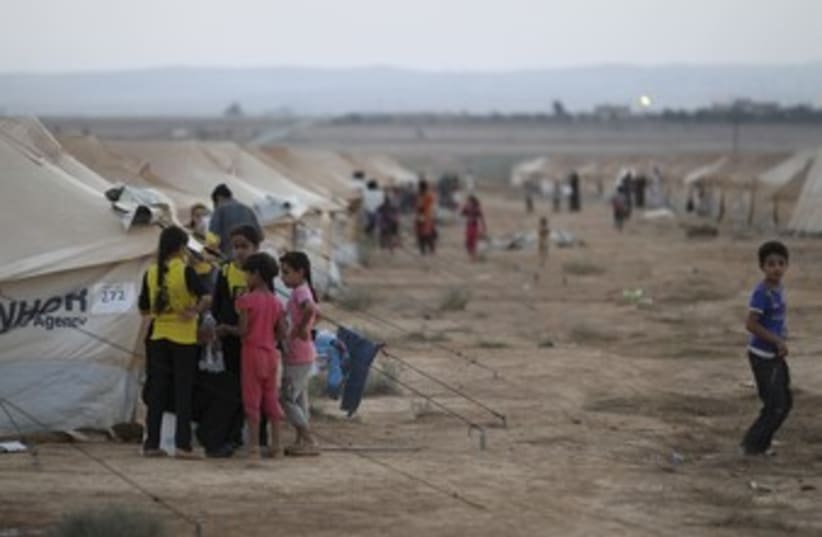“When people come, they come with nothing. They need shelter, they need food, they need medical care, they really need just about everything,” she said.As the war between Syrian rebels and forces loyal to President Bashar Assad intensifies, more refugees have been spilling out of Syria, usually moving by night. The greatest movement is often on nights when there is a minimum of moonlight, because brighter evenings make it harder for people to move without being seen – and Syrians trying to escape have often been shot at or shelled, UN officials say.Jordanian officials, together with the UN, put up the Za’atri camp in the northern part of the kingdom but are finding that even more refugees than anticipated are flooding across the border.“This crisis is beyond the resources that are being extended by us or the efforts of the UNHCR or other humanitarian bodies,” said Jordanian Minister of State for Information Samih Maaytah. “It needs an international program and response,” the cabinet minister told Reuters. In all, 214,120 Syrians have registered regionally as refugees or are awaiting registration, and about 70,000 of them are in Jordan. Others have fled to the other neighboring Arab countries, including Iraq and Lebanon, though Turkey has been hit with the biggest wave of refugees – over 74,000.The UNHCR announced at a press conference in Geneva Tuesday that Turkey was seeing the most significant increase, but that the numbers in Jordan were expected to continue skyrocketing.“In Turkey the number of Syrians arriving at the border has increased dramatically,” Melissa Fleming, chief spokeswoman for the UNHCR, told a news briefing.“Compared to previous weeks, which saw around 400-500 people arriving daily, up to 5,000 people have been arriving at the borders every day over the past two weeks. In the past 24 hours over 3,000 Syrians are reported to have crossed into Turkey, with a further 7,000 expected to cross in the coming days,” Fleming said.Added Fleming: “We do believe this could be the start of a major, a much larger influx into Jordan.”Conditions in the camps in Jordan, the biggest of which is Za’atri, are extremely harsh. Those who are lucky enough to get a place are dealing with soaring desert temperatures, dust storms and a shortage of everything but the absolute basics.“We’ve been trying to improve conditions in camps and control the dust by putting in fine gravel,” said Rummery, the UNHCR official in Jordan.“The assistance is in place to provide these things but with a rapid influx like this, we need to help an unexpected number of arrivals,” she added. “We never really know on any given night how many will come. Many more thousands are waiting to cross, and they come at night.”Jordan, which only a few years ago found itself forced to deal with a massive influx of refugees from Iraq, is again being asked to shoulder the burden that comes with housing thousands of people fleeing conflict, unsure when they’ll return.On Monday, the Jordanian government’s Ministry of Planning and International Cooperation and the UN launched a $429 million aid appeal to provide health, education and other basic services, the Middle East North African Financial Network reported. The refugees’ electricity and water consumption alone is projected to cost the country $54 million, according to a MENAFN-Jordan Times report.Jordanian officials have allowed most refugees to seek safe haven in the kingdom, but they have also begun a “filtering process,” fearing that Assad’s men will enter the country with the refugees and undermine Jordan’s security, according to a Jordanian political source.
Reuters contributed to this report.
